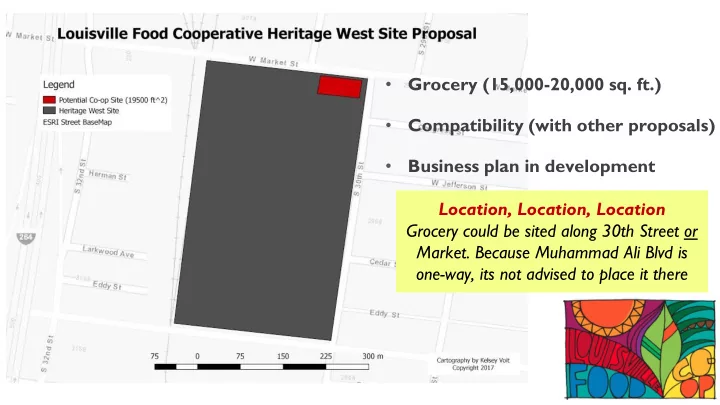

Grocery (15,000-20,000 sq. ft.) • • Compatibility (with other proposals) • Business plan in development Location, Location, Location Grocery could be sited along 30th Street or Market. Because Muhammad Ali Blvd is one-way, its not advised to place it there
Use Mix
Financing Start-up and Equity Funding Membership Shares $162,500 500 members @ $100 share 100 members @ $1,000 share ($100 share + $900 donation) 500 members @ $25 low income senior shares Grassroots Fundraising $100,000 Events, Churches, Crowd-sourcing Foundations/Private Philanthropy $500,000 Public investment/grants $500,000 Non-traditional Metro Government, State and Federal – USDA $1.26 million Model = Total Equity Non-traditional Development and Loan Funding Financing Private grants and loans Much depends on Member Loans new building vs existing Individual sources of financing building
Community Partners & Advisors Community Partners • Center for Neighborhoods • Community Farm Alliance (CFA) Food in Neighborhoods Community Coalition • New Roots - Fresh Stop Markets • • Shawnee Arts and Cultural Center Technical Assistance Advisors • The Kentucky Center for Agriculture & Rural Development (KCARD) • University of Louisville - Brandeis School of Law and Business School Other Cooperatives • Apple Street Market (Cincinnati, OH) • Good Foods Co-op (Lexington, KY) • Greensboro Community Co-op (Greensboro, NC) Mandela Foods Co-op (Oakland, CA) • Pogue’s R un Cooperative (Indianapolis, IN) •
Co-op Alignment with Vision Louisville Sustainability: Member-owned business; Creativity: Community-driven business Fresh food is a basic human need with multiple community partners Economy: Cooperative ownership model Health: Provide fresh, locally-sourced provides community-wealth building; produce at an affordable price and Supports local farmers convenient location where there is little access Livability: Affordable, healthy food and living wage jobs Authenticity: Community-driven business model Connectivity: Shoppers from all parts of city; Community-owned & member directed
Co-op Alignment with Community Priorities Sustainability: Community-driven business Economy: Provide community-owned business opportunity to West Louisville residents; Commitment to Fair Labor Standards Livability: Enhance neighborhood by providing a reliable source of fresh foods within the urban core Connectivity: Grassroots effort with extensive community listening; anchor store for other businesses on Heritage West site Creativity: Community hub for art, music, cultural and education Health: Provide source of high-quality fresh produce at affordable prices Authenticity: Member & community-driven grassroots effort
Organizing & Development Timeframe Summer 2017 Family-oriented cooperative workshops begin (July 10) • • Feasibility study (UofL MBAs) • Hire project manager Fall 2017 • Begin business planning (UofL MBAs) Continue outreach and workshops – narrow location options • • Launch membership campaign Winter/Early 2018 • Host Summit • Secure location and hire developer Launch capital campaign • Summer 2018 - Ground breaking! Winter/Early 2019 - Store opens!
Recommend
More recommend